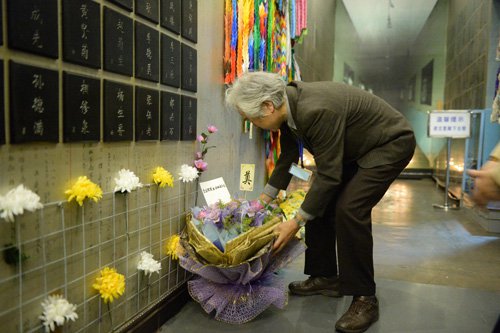|
 |
|
MOURNING: A member of a visiting Japanese medical delegation lays a bouquet before a monument for Unit 731 victims in Harbin of northeast China's Heilongjiang Province on May 4 (WANG KAI) |
 With the emergence of new evidence of biological experiments on humans conducted by the Japanese army in China in the first half of the last century, the brutal crimes of Imperial Japan and its militarism have been denounced universally. With the emergence of new evidence of biological experiments on humans conducted by the Japanese army in China in the first half of the last century, the brutal crimes of Imperial Japan and its militarism have been denounced universally.
Particularly, the testing of chemical and biological weapons on live humans by Unit 731 of the Imperial Japanese Army during World War II is among the most savage acts in the history of humanity. A post-war investigation conducted by the United States showed that in 1943 alone, over 800 people fell victim to Unit 731's tests. In 1945, the number was around 1,000. According to the confession of Japanese war criminals at a trial in the former Soviet Union's Khabarovsk in December 1949, at least 3,000 experiments were conducted on humans by Unit 731.
However, out of their own interests, the United States covered up the gruesome atrocities of Unit 731 and offered those responsible for the chemical and biological warfare a plea bargain in return for their research results. Thus, the brutalities of the Japanese army are seldom discussed publicly. Only a small set of details on what Unit 731 did were mentioned and made public during the Khabarovsk trial.
In the course of the Khabarovsk trial, one Unit 731 army officer confessed that on January 26, 1938, the Headquarters of the Japanese Kwantung Army stationed in northeast China ordered its troops to send recently arrested individuals directly to the military police in Harbin, northeast China's Heilongjiang Province, without the need of any legal procedures. This was known as "special transfer" in the order. As "special transfer" was a euphemism used by the Kwantung military police, even ordinary officers did not know what the real purpose of such activities were.
Saito Yoshio, then chief of the police section of the Japanese Kwantung Army, confessed after the war that "special transfer" referred to sending prisoners to Unit 731.
However, since only an incomplete testimony from the Khabarovsk trial was available, most details about the Japanese army's biological and chemical warfare testing on humans had remained unknown, which inspired Japanese right-wing forces' attempts to deny they even took place at all. Thus, the documents recently published by Changchun-based Jilin Provincial Archives about "special transfers" serve as valuable evidence of the Japanese army's crimes.
In 1999, the Heilongjiang Provincial Archives also uncovered documents that recorded a "special transfer" involving 52 anti-Japanese intelligence agents, of whom 42 were sent to the Kwantung military police in Harbin. On the basis of this evidence, the Jilin Provincial Archives conducted extensive research into its collections of documents on the Kwantung military police and found about 200 files that refer to "special transfers" of at least 277 people, including Chinese, Korean, Mongolian and Soviet citizens.
The names of 33 people are mentioned in documents on "special transfers" in both Jilin and Heilongjiang provincial archives. This is due to the fact that Changchun in Jilin Province was the capital of the Japan-controlled Manchurian regime in northeast China as well as the headquarters of the Kwantung military police. There are documents of correspondence between the Kwantung military police and its various branches. Therefore, the documents collected in the two provinces reinforce one other. There are more relatively complete documents stored at the headquarters of the Kwantung military police in Changchun. These form important proof of Japan's atrocities in China.
Japanese scholars affiliated with peace-loving organizations have shown great concern over the newly uncovered archives in Jilin. They claim that war crimes as a general concept have failed to arouse reflection on the country's past from the Japanese people, but the exceptional inhuman brutality of the Unit 731's bacterial experiments on live humans could possibly shock people enough to start such introspection.
The author is a former Director of the Institute of Modern History under the Chinese Academy of Social Sciences
Email us at: yulintao@bjreview.com
Unit 731 Testimony
"In 1945, when Unit 731 withdrew from China, the commander ordered the killing of all 400 prisoners with poisonous gas, and then the bodies were burnt. As there were too many bodies, the commander asked us to put a large number of the bodies into bags and then throw them into the Songhua River [in northeast China's Heilongjiang Province]. I, as a driver of the Transportation Squad, was tasked with taking the bodies there."
—Susumu Suzuki, a driver for the Transportation Squad of Unit 731
"Almost every day, there were special prison vans delivering "marutas" (logs), human beings for experiments, to Unit 731. Every special prison van had 10 license plates. And the plates were frequently changed to deceive the public."
—Ikario Okoshi, a driver for Ishii Shiro, head of Unit 731
"As a military policeman in 1944, I took four Chinese men to Unit 731. I did not know exactly what Unit 731 was doing at the time, but I knew that the men I took there would never return alive. I have to say that my act should be regarded as murder."
—Yutaka Mio, a former Kwantung military policeman in Dalian, northeast China's Liaoning Province
(Source: Interviewed and compiled by Jin Chengmin, Curator of the Museum of War Crime Evidence by Japanese Army Unit 731) | 